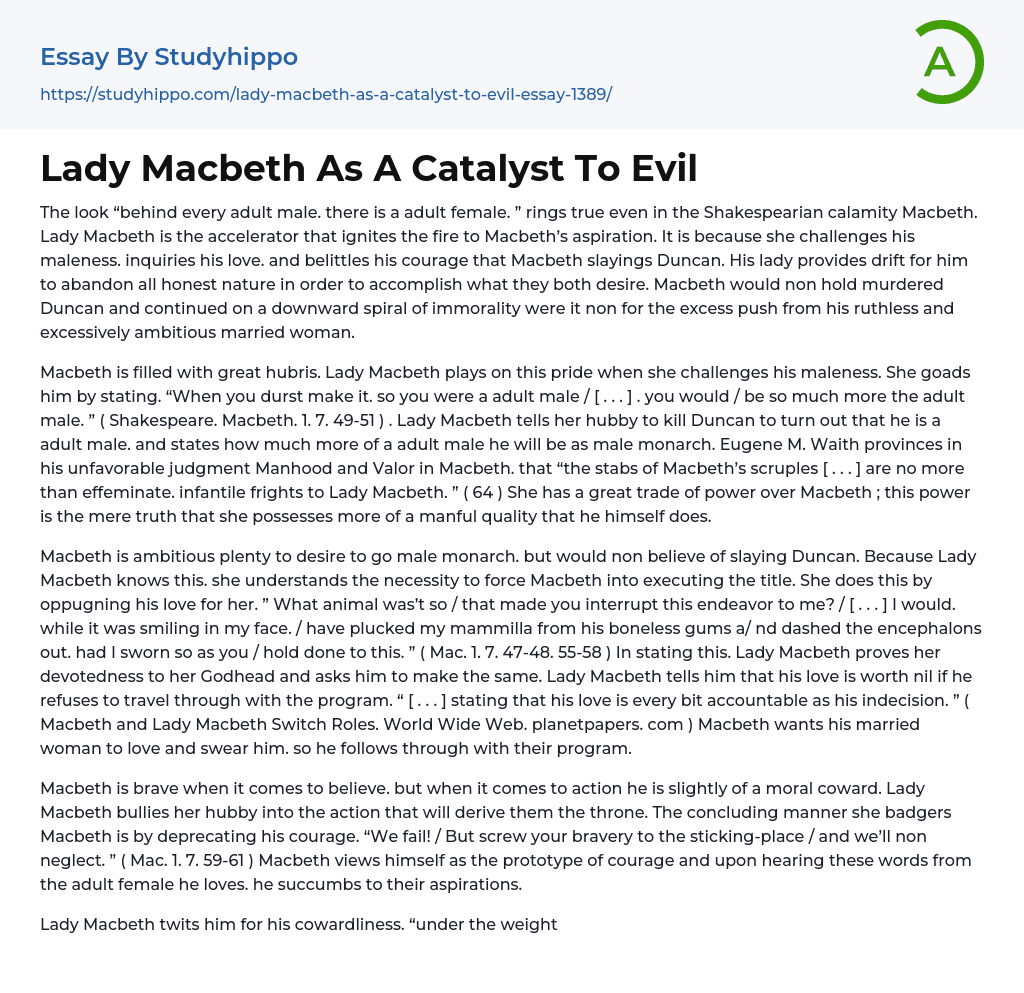The look “behind every adult male. there is a adult female. ” rings true even in the Shakespearian calamity Macbeth. Lady Macbeth is the accelerator that ignites the fire to Macbeth’s aspiration. It is because she challenges his maleness. inquiries his love. and belittles his courage that Macbeth slayings Duncan. His lady provides drift for him to abandon all honest nature in order to accomplish what they both desire. Macbeth would non hold murdered Duncan and continued on a downward spiral of immorality were it non for the excess push from his ruthless and excessively ambitious married woman.
Macbeth is filled with great hubris. Lady Macbeth plays on this pride when she challenges his maleness. She goads him by stating. “When you durst mak
...e it. so you were a adult male / [ . . . ] . you would / be so much more the adult male. ” ( Shakespeare. Macbeth. 1. 7. 49-51 ) . Lady Macbeth tells her hubby to kill Duncan to turn out that he is a adult male. and states how much more of a adult male he will be as male monarch. Eugene M. Waith provinces in his unfavorable judgment Manhood and Valor in Macbeth. that “the stabs of Macbeth’s scruples [ . . . ] are no more than effeminate. infantile frights to Lady Macbeth. ” ( 64 ) She has a great trade of power over Macbeth ; this power is the mere truth that she possesses more of a manful quality that he himself does.
Macbeth is ambitious plenty to desire to go male monarch. but would non believe of slaying Duncan. Because Lady Macbeth knows this.
she understands the necessity to force Macbeth into executing the title. She does this by oppugning his love for her. ” What animal was’t so / that made you interrupt this endeavor to me? / [ . . . ] I would. while it was smiling in my face. / have plucked my mammilla from his boneless gums a/ nd dashed the encephalons out. had I sworn so as you / hold done to this. ” ( Mac. 1. 7. 47-48. 55-58 ) In stating this. Lady Macbeth proves her devotedness to her Godhead and asks him to make the same. Lady Macbeth tells him that his love is worth nil if he refuses to travel through with the program. “ [ . . . ] stating that his love is every bit accountable as his indecision. ” ( Macbeth and Lady Macbeth Switch Roles. World Wide Web. planetpapers. com ) Macbeth wants his married woman to love and swear him. so he follows through with their program.
Macbeth is brave when it comes to believe. but when it comes to action he is slightly of a moral coward. Lady Macbeth bullies her hubby into the action that will derive them the throne. The concluding manner she badgers Macbeth is by deprecating his courage. “We fail! / But screw your bravery to the sticking-place / and we’ll non neglect. ” ( Mac. 1. 7. 59-61 ) Macbeth views himself as the prototype of courage and upon hearing these words from the adult female he loves. he succumbs to their aspirations.
Lady Macbeth twits him for his cowardliness. “under the weight of her reproaches of cowardliness he has
dared make more. and has become less [ . . . ] ” ( Brooks. 45 ) . Throughout the Renaissance. the thought that to be brave is to be a adult male prevails. At the beginning of the drama. Macbeth represents the ideal Elizabethan hero ; hence. courage is an of import character property. Lady Macbeth’s pitilessness and use of Macbeth causes him to withstand his true rules and to slay Duncan.
From the beginning of Act One Scene Five. until after the slaying of Duncan. it is apparent that Lady Macbeth manipulates and convinces Macbeth to make evil. Lady Macbeth knew that he would ne'er travel through with it entirely. she realizes that he holds excessively much of the “milk of human kindness” ( Mac. 1. 5. 12 ) to of all time finish such an dismaying effort. Lady Macbeth uses persuasion to hale her hubby. Had she non mocked his maleness. challenged of his love. and vilified his courage. Macbeth would non hold been pressured into the slaying of his male monarch and push onto a way of malignity led by aspiration.
- Banquo essays
- Macbeth Ambition essays
- Ambition essays
- Anger essays
- Betrayal essays
- Boredom essays
- Confidence essays
- Courage essays
- Desire essays
- Disgrace essays
- Doubt essays
- Empathy essays
- Fairness essays
- Fear essays
- Feeling essays
- Forgiveness essays
- Grief essays
- Guilt essays
- Happiness essays
- Harmony essays
- Hate essays
- Honesty essays
- Honor essays
- Hope essays
- Humanity essays
- Inspiration essays
- Kindness essays
- Laughter essays
- Loneliness essays
- Lost essays
- Loyalty essays
- Need essays
- Passion essays
- Pressure essays
- Pride essays
- Regret essays
- Respect essays
- Responsibility essays
- Sarcasm essays
- Shame essays
- Suffering essays
- Suspense essays
- Tolerance essays
- A Doll's House essays
- A Midsummer Night's Dream essays
- A raisin in the sun essays
- A Streetcar Named Desire essays
- An Inspector Calls essays
- Death of a salesman essays
- Everyman essays




